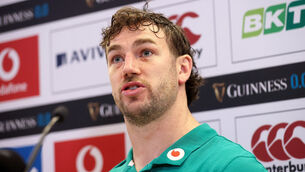Joe Schmidt plays cool on Jaco Peyper's performance

With Robbie Henshaw, CJ Stander, and Rob Kearney all facing Head Injury Assessments in the coming days as they bid to prove their fitness to face Australia on Saturday in the final game of this month’s Guinness Series, questions were rightly being asked of the manner in which referee Jaco Peyper had handled the weekend’s astonishingly physical Test match between Ireland and New Zealand.
In a game which saw two All Blacks sin-binned and the world champions concede 14 penalties, several of which were for high tackles, it appears the South African official had not received the memo issued eight days previously regarding his employers’ toughened stance on player safety.












